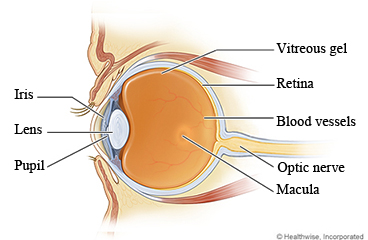
Overview
Diabetes can damage the small blood vessels in part of your eye. This part of the eye is called the retina. It detects light that enters the eye. Then it sends signals to your brain about what the eye sees.
When this type of eye damage happens, it's called diabetic retinopathy. It can lead to poor vision and even blindness. But if you keep your blood sugar and blood pressure levels in your target range, you can help avoid or slow the damage.
Follow-up care is a key part of your treatment and safety. Be sure to make and go to all appointments, and call your doctor if you are having problems. It's also a good idea to know your test results and keep a list of the medicines you take.
How can you care for yourself at home?
- Have regular eye exams. Tell your doctor about any changes in your vision.
- Keep your blood sugar in your target range.
- Eat a variety of healthy foods, and follow your meal plan so you know how much carbohydrate you need for meals and snacks.
- Stay as active as you can. For many people, walking is a good choice. Bit by bit, increase the amount you are active every day. Try for at least 30 minutes on most days of the week.
- Be safe with medicines. Take your medicine exactly as prescribed. Call your doctor if you think you are having a problem with your medicine.
- Check your blood sugar as often as your doctor recommends.
- Eat a low-salt diet. If you have high blood pressure, this may help lower it. You may also need to take medicines to reach your goals.
- If you smoke, quit or cut back as much as you can. If you need help quitting, talk to your doctor about stop-smoking programs and medicines. These can increase your chances of quitting for good.
- Avoid risky activities. These include things like weight lifting and some contact sports. They may trigger bleeding in the eye through impact or increased pressure.
- Talk to your doctor if you are pregnant or planning to get pregnant. Retinopathy can get much worse during pregnancy. Planning ahead with your doctor and following the doctor's instructions can decrease this risk.
When should you call for help?
Call your doctor now or seek immediate medical care if:
- You have sudden vision changes.
Watch closely for changes in your health, and be sure to contact your doctor if:
- You have increasing trouble doing everyday tasks like driving or reading because of your eyesight.
Where can you learn more?
Go to http://www.healthwise.net/patientEd
Enter R396 in the search box to learn more about "Diabetic Retinopathy: Care Instructions".
Current as of: April 30, 2024
Author: Ignite Healthwise, LLC Staff
Clinical Review Board
All Ignite Healthwise, LLC education is reviewed by a team that includes physicians, nurses, advanced practitioners, registered dieticians, and other healthcare professionals.

